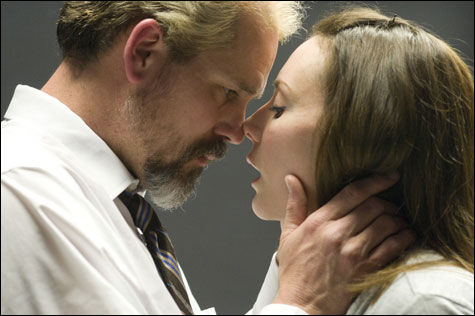
MONSTER? Abuse is abuse, but what happened between Una and Ray isn’t so clear. |
The year 2007 was a banner one for British theater. The nominees for the Olivier Award for best new play included Tom Stoppard's Rock 'n' Roll, which was about Syd Barrett and the 1968 Prague Spring, Peter Morgan's Frost/Nixon, which was about the title duo and Watergate, and Conor McPherson's The Seafarer, which featured no less a character than — yes, Church Lady — Satan.And the Olivier went to . . . David Harrower's Blackbird? A play about a confrontation between two desperate nobodies and . . . well, I'm not going to tell you quite yet what it's about. Suffice to say that Boston will have had the luxury of seeing all four plays this season, thanks to Broadway Across America (F/N), the Huntington Theatre Company (R&R), and SpeakEasy Stage, which got the rights to both The Seafarer and Blackbird.
These works by Stoppard, McPherson, and Morgan are all excellent examples of the well-made play (though Frost/Nixon is a better movie), and they're about obviously big themes. But if you agree with Edward Albee that playwrights should be slugging audiences in the face, the aptly named Harrower's play (at SpeakEasy through March 21) is for you. It was for director David R. Gammons, who felt as if he'd been punched in the stomach after reading it. But don't worry, you'll feel no physical pain, except for at least one moment of almost unbearable tension. SpeakEasy got permission to Americanize the Scottish writer's work, the better to keep that tension immediate.
As good as the local actors were, if you saw the other three plays, it would have been appropriate to say, "I wish I had seen Brian Cox/Ciarán Hinds/Frank Langella in the role." But Gammons and his two actors, Marianna Bassham and Bates Wilder, make this play their own, with help from a crack design team.
Blackbird begins as Wilder's Ray shoves Bassham's Una into his office in an industrial building. The floor is covered with fast-food packaging because the staff eat there, and they don't clean up after themselves.
Ray didn't either. Sixteen years earlier, as we find out almost a third of the way into the 90 minutes, the 40-year-old Ray, after a long flirtation, took the 12-year-old Una to an inn, where they had sex. Ashamed, he left her there alone.
The obvious point of comparison for Blackbird is Paula Vogel's 1998 Pulitzer winner, How I Learned To Drive, another play in which a woman looks back at her teenage relationship with an older man, in this case her uncle. Although Vogel didn't make the uncle out to be a monster, the moral center of her play is clear.
Here, we never quite know where we are. Una is certainly looking back in anger, and she rightly blames Ray for ruining her life. But the heart can't be so easily dissected, as the pair's shifting stories of what happened make for shifting emotional sands — for them, as well as for us.